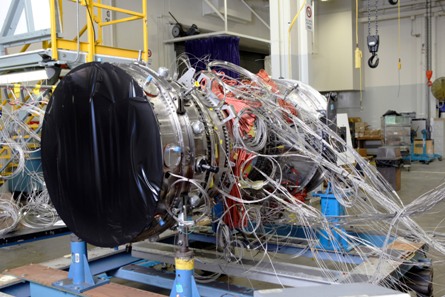General Electric (GE) says it completed engine core testing for its ADaptive Versatile ENgine Technology (ADVENT) demonstrator earlier this month on 6 February. The prototype variable-cycle engine reached the "highest combination of compressor and turbine temperatures ever recorded in aviation history", says the company, which is working on the programme for the US Air Force Research Laboratory (AFRL).
GE says that the ADVENT effort will wrap-up later this year with a full engine test. However, the technologies developed through the programme will be used on the AFRL's the follow-on Adaptive Engine Technology Demonstrator (AETD) development.
 |
|---|
General Electric |
"This is a critical milestone that gives us great confidence as we prepare for the full engine test in ADVENT later this year and move forward on the design of the AETD engine," says Dan McCormick, GE's general manager for the ADVENT and follow-on AETD programmes. "We'll integrate these proven ADVENT technologies into our AETD engine, along with advanced controls and exhaust system designs."
GE attributes the accomplishment to advanced lightweight, heat-resistant ceramic matrix composite (CMC) materials, which combined with an adaptive low pressure spool, result in a 25% improvement in fuel efficiency, a 30% increase in operating range and a 5% to 10% improvement in thrust compared to existing fixed-cycle engines.
GE says it completed the initial design review for its version of the AETD engine on 8 February. A preliminary design review milestone is scheduled for November 2014. The AETD programme will conclude in 2016 following fan rig testing and a core engine test.
Pratt & Whitney is developing a rival engine for the AETD programme, having displaced Rolls & Royce, which was developing a competing ADVENT engine.
Source: Flight International




















